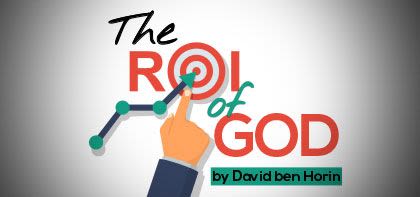
The ROI of God
What is the return on investment (ROI) of a Torah life? The return is strength through purpose in this life, and wealth beyond all measure in the Next Life.

In Ethics of the Fathers, Rabbi Yehudah HaNassi states:
Consider the cost of a mitzvah against its rewards, and the rewards of a transgression against its cost (Pirkei Avot 2:1).
That sounds like an ROI analysis for any investment. Let’s ask the question: What is the return on investment (ROI) of a Torah life?
The classic definition of an investment is sacrificing something you have right now for the return of something greater in the future. It can be money. It can be effort. It can be pleasure or happiness.
Torah
There is a greater investment in being good. Being good is like running for 30 minutes.
It’s not fun until you get used to it. It always requires effort. The return on the effort, like feeling good, usually only kicks in after 30 minutes when your endorphins kick in. The long-term impact will eventually feel good, but it takes time. Therefore, our initial reaction to running a half hour is often a groan. The task only feels good once you do it so much you get addicted to it.
However, the long–term benefits are superior. Running makes you feel good at every moment. You can do more with your body. You can snap back from illness or injury faster.
The same can be said about mitzvot.
Mitzvot are the same in that your spirit is elevated for every moment you are performing them. You feel stronger. You feel more at peace with yourself. A strong spirit means you can do a lot more with your mind, and with your willpower. Even when you sin, if it is an isolated act that goes against all the Divine Commandments you are following, you can make repentance quickly and G-d willing, gain forgiveness from Hashem faster.
Health is a long-term goal that requires a lifetime commitment. Anyone investing in a healthy body takes on a lifetime of purpose with a set goal to pursue all his life. Mitzvot are a lifetime pursuit. Your days are filled with purpose. You have the joy of advancing on your goals, the agony of falling short, and the determination to do better next time as you forge towards the light at the completion of your life.
The great benefit of Torah is eternity. Once your life is complete, the real returns kick in, and they are forever.
Sin
There is little investment in sin. Sin is more like a purchase.
It’s like smoking a cigarette. It’s fun. It feels good. The gratification comes instantly.
The downside is that sin only feels good while you are doing it. When you are not doing it, all you can do is think about it until you can do it again. Think about vice: drinking, drugs, lust, gluttony, smoking. These are all things that you only feel while you are doing it. When you are not doing it, you don’t feel the gratification.
Even if the ROI of your wildest fantasies is a million times the investment, the moment the fantasy ends – it drops to zero. In fact, it often drops into the negative, because sin leaves you feeling bottom of the basement terrible when you’re done with it.
There is no long–term benefit to sin even if you become good at it. Take a drug dealer; the better he becomes at what he does, the more sins he commits, and the worse off he is. How about the manager of a nightclub? A tabloid editor? The sacrifices they make to become really good at what they do only lead to causing others to sin, and proliferating the minuses on their account which they have to settle at the end of their journey.
Then there is the bottom line: Eternity.
At best, if G-d forgives all your sins, you have nothing waiting for you in the World of Eternity. All the enjoyment was squandered while you were alive. The minuscule return on the investment of sin only accrues while you are in the act. When you aren’t doing it, and when you are no longer in this world where you can do it – you get nothing.
Sage Investment Advice
The sacrifice we make in the short term are the pleasures associated with sin. The currency we put down are the labors we perform to learn Torah, give tzedaka (charity), improve our character traits, and perform all of Hashem’s Commandments.
The return is strength through purpose in this life, and wealth beyond all measure in the Next Life.
As we learn in Ethics of the Fathers, “One hour of repentance and good deeds in this world is better than all the life of the World to Come; and one hour of bliss in the World to Come is better than all the life of this world” (Pirkei Avot 4:17).
***
David Ben Horin lives in Israel with his wife and children.







Tell us what you think!
Thank you for your comment!
It will be published after approval by the Editor.